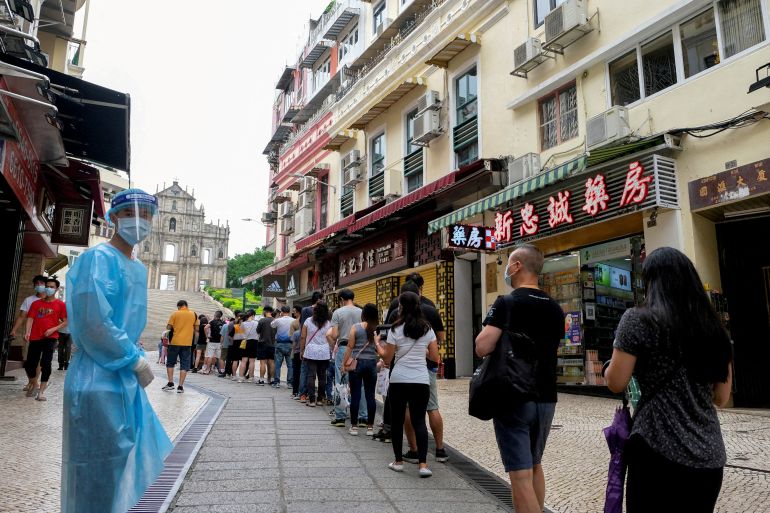Macau closes casinos for first time in two years over COVID
Chinese territory and other cities on mainland impose strict curbs to stamp out an Omicron-fuelled outbreak of the virus.

Macau has closed all its casinos for the first time in more than two years and other cities in China have imposed more curbs asthey try to contain Omicron-fuelled outbreaks of the coronavirus.
Macau’s more than 30 casinos will shut for at least a week, with residents told to stay home for all but essential trips.
Keep reading
list of 3 itemsCan China revive its COVID-hit economy?
Hong Kong to open beaches, extend nightlife as COVID curbs ease
Police will monitor flows of people outside and stringent punishments will be imposed on those who disobey, said the government, which is following mainland China’s strict “zero COVID” approach.
Macau has recorded about 1,500 cases since mid-June, with some 19,000 people in mandatory quarantine.
More than 30 zones have been deemed high risk and have been locked down, with no one allowed to enter or exit for at least five days.
Many casinos had already been operating with minimal staffing for the past three weeks, but this is the first time they have been completely closed since February 2020.
The restrictions in Macau come as multiple cities on the mainland began adopting new curbs to control the spread of COVID-19.
In Shanghai, residents were bracing for another mass testing campaign after a case of the BA.5 sub-variant was found.
In the central province of Henan, the town of Qinyang has almost completely locked down its nearly 700,000 residents from Sunday, with one person from each household allowed out every two days to get groceries.
In some areas, people have been told not to leave home at all.
Four major districts in the northwestern city of Lanzhou, in Gansu province, and the southern cities of Danzhou and Haikou in Hainan province, are under temporary curbs for several days, with entertainment and cultural spaces closed.
The city of Nanchang in southern Jiangxi province, with 6.3 million residents, shut some entertainment venues on Saturday, although the duration of the curbs was not specified.
In the northwestern province of Qinghai, the city of Xining kicked off a mass testing campaign on Monday after one person tested positive on Sunday.
Several major districts in the southern metropolis of Guangzhou also began mass tests on Monday
Meanwhile, nearby Hong Kong said it was considering adding real-name registration to its COVID-19 contact tracing app to ensure people who had the virus or had been ordered to undergo testing did not continue to move about the city.
Hong Kong’s new health minister, Lo Chung-mau, said the change would protect the freedoms of those without the virus.
“Everyone agrees that those who have COVID-19 should actually not go out and harm the rest of the population,” Lo told a television programme on Sunday. “If we give COVID-19 positive people freedom and let them roam the surrounding areas, those without COVID-19 will have their freedoms affected.”
The health code system is used in the mainland and Macau and has three levels: red, yellow and green. Only those whose app is green are allowed to enter places like restaurants.
Strict curbs have fuelled frustration among residents in the mainland as well as both Chinese territories.
Residents in Macau have already been tested six times for the coronavirus since mid-June and are expected to do rapid antigen tests daily. As part of the new measures, they will be required to take part in mass COVID-19 tests four times this week.
More than 90 percent of the territory’s 600,000 people are fully vaccinated against the virus.